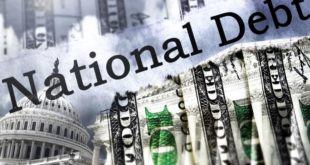Immigration has raised concerns in some about America’s demographic future. Some propose that an influx of migrants with foreign worldviews will fracture American society. This argument is based on the finding that the diversity generated by immigration deters social trust. Trust is a crucial ingredient for societies to thrive by establishing collaborative institutions. Trusting societies are more cooperative and innovative because when people trust each other, they...
Read More »Republicans Fail on the Debt Ceiling in 2023
The United States House of Representatives’ passage of the Limit, Save, Grow Act of 2023 is a big Republican failure addressing the debt ceiling. The debt ceiling would be raised above the current limit of $31 trillion by $1.5 trillion or through March 2024, whichever comes first. Notably, “official cost estimates have not yet been released,” so the projected paltry $480 billion annual spending reductions likely will be much less. This is because this bill “does not...
Read More »In the Event of an Official US Bankruptcy
Economically speaking, the US government is bankrupt even if the government won’t admit what is obvious. But how would an actual bankruptcy proceeding go? Original Article: "In the Event of an Official US Bankruptcy" [embedded content] Tags: Featured,newsletter
Read More »The Bankruptcy Caravan Is Now Arriving: Time to Pay for the Easy Money
The character Mike Campbell in Ernest Hemingway’s 1926 novel The Sun Also Rises was asked about his money troubles and responded with a vivid description embracing self-contradiction: “‘How did you go bankrupt?’ Bill asked. ‘Two ways,’ Mike said. ‘Gradually and then suddenly.’” Ground-hugging interest rates for more than a decade kept the inefficient and the incompetent in business. Now, the jig is up, with a Mother’s Day weekend corporate massacre that saw the...
Read More »Taxing Capital Leads to Capital Consumption
Progressive governments in the name of equity are calling for taxation of capital gains. They really are demanding destruction of capital through capital consumption. Original Article: "Taxing Capital Leads to Capital Consumption" [embedded content] Tags: Featured,newsletter
Read More »“Trans Rights” Means Trans Entitlements and the End of Civil Society
A “civil society” is a community of individuals who are linked together by common interests and activities. Common interests include being able to walk the streets safely (peace) and to exercise such rights as freedom of speech (individual freedom). These shared interests allow common activities to flourish, including commerce and the education of children. Civil society is possible only because most people want to live securely, protect their loved ones, and...
Read More »The Money Supply Has Plummeted in the Biggest Drop Since the Great Depression
With negative growth now falling to near –10 percent, money-supply contraction is now the largest we've seen since the Great Depression. Original Article: "The Money Supply Has Plummeted in the Biggest Drop Since the Great Depression" [embedded content] Tags: Featured,newsletter
Read More »The Lure of a Stable Price Level
One of the reasons that most economists of the 1920s did not recognize the existence of an inflationary problem was the widespread adoption of a stable price level as the goal and criterion for monetary policy. The extent to which the Federal Reserve authorities were guided by a desire to keep the price level stable has been a matter of considerable controversy. Far less controversial is the fact that more and more economists came to consider a stable price level as...
Read More »Finance Discovers Sting: “How Fragile We Are”
Despite the soothing hot air from the White House and Fed officials, the financial system is becoming increasingly fragile and unstable. Maybe all of that intervention the past decade was not wise. Original Article: "Finance Discovers Sting: "How Fragile We Are"" [embedded content] Tags: Featured,newsletter
Read More »Progressives Want to Eliminate Wealthy Entrepreneurs but Need the Wealth They Create
Modern culture is biased against those that are rich even while depending upon the wealth that successful entrepreneurs have created. Original Article: "Progressives Want to Eliminate Wealthy Entrepreneurs but Need the Wealth They Create" [embedded content] Tags: Featured,newsletter
Read More » Swiss Economicblogs.org
Swiss Economicblogs.org




